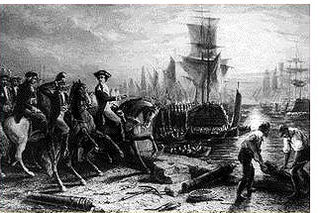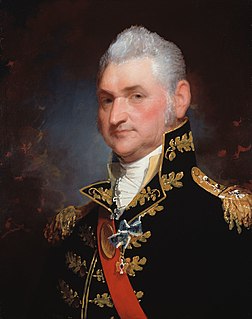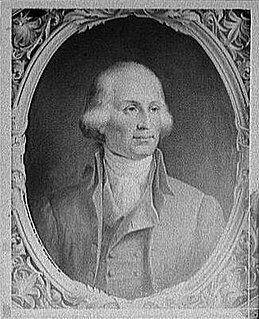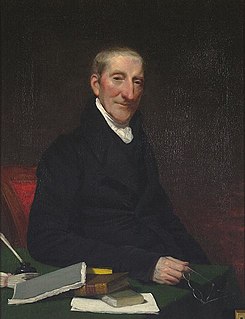
George Washington was an American military officer, statesman, and Founding Father who served as the first president of the United States from 1789 to 1797. Appointed by the Continental Congress as commander of the Continental Army, Washington led the Patriot forces to victory in the American Revolutionary War and served as the president of the Constitutional Convention of 1787, which created the Constitution of the United States and the American federal government. Washington has been called the "Father of the Nation" for his manifold leadership in the formative days of the country.

The siege of Boston was the opening phase of the American Revolutionary War. New England militiamen prevented the movement by land of the British Army, which was garrisoned in what was then the peninsular town of Boston, Massachusetts Bay. Both sides had to deal with resource, supply, and personnel issues over the course of the siege. British resupply and reinforcement was limited to sea access, which was impeded by American vessels. The British abandoned Boston after eleven months and transferred their troops and equipment to Nova Scotia.

Henry Dearborn was an American military officer and politician. In the Revolutionary War, he served under Benedict Arnold in his expedition to Quebec, of which his journal provides an important record. After being captured and exchanged, he served in George Washington's Continental Army. He was present at the British surrender at Yorktown. Dearborn served on General George Washington's staff in Virginia.

Button Gwinnett was a British-born American Founding Father who, as a representative of Georgia to the Continental Congress, was one of the signers of the United States Declaration of Independence. He was also, briefly, the provisional president of Georgia in 1777, and Gwinnett County was named for him. He was named in honor of his mother’s cousin, Barbara Button, who became his godmother. Gwinnett was killed in a duel by rival Lachlan McIntosh following a dispute after a failed invasion of East Florida.

Thomas Johnson was an 18th-century American lawyer, politician, and patriot. He was a delegate to the First Continental Congress in 1774, where he signed the Continental Association; commander of the Maryland militia in 1776; and elected first (non-Colonial) governor of Maryland in 1777. Throughout his career, Johnson maintained a personal and political friendship with George Washington, who gave him a recess appointment as an associate justice of the Supreme Court in August 1791. He served only briefly, resigning in January 1793, citing health issues.

Samuel Osgood was an American merchant and statesman born in Andover, Massachusetts, currently a part of North Andover, Massachusetts. His family home still stands at 440 Osgood Street in North Andover and his home in New York City, the Samuel Osgood House, served as the country's first Presidential mansion. He served in the Massachusetts and New York State legislatures, represented Massachusetts in the Continental Congress and was the fourth Postmaster General of the United States, serving during George Washington's first term.

Brigadier-General Rufus Putnam was a colonial military officer during the French and Indian War, and a general in the Continental Army during the American Revolutionary War. As an organizer of the Ohio Company of Associates, he was instrumental in the initial settling of the Northwest Territory in present-day Ohio following the war.

George McIntosh Troup was an American politician from the U.S. state of Georgia. He served in the Georgia General Assembly, U.S. House of Representatives, and U.S. Senate before becoming the 32nd Governor of Georgia for two terms and then returning to the U.S. Senate. A believer in expansionist Manifest Destiny policies and a supporter of native Indian removal, Troup was born to planters and supported slavery throughout his career. Later in his life, he was known as "the Hercules of states' rights."

William McIntosh, was also commonly known as Tustunnuggee Hutke, was one of the most prominent chiefs of the Creek Nation between the turn of the nineteenth century and his execution in 1825. He was a chief of Coweta town and commander of a mounted police force. He became a large-scale planter, built and managed a successful inn, and operated a commercial ferry business. Early American historians attributed McIntosh's achievements and influence to his mixed race Scots/European ancestry. Since the late 20th century, historians have argued much of McIntosh's political influence stemmed more from his Creek upbringing and cultural standing, particularly his mother's prominent Wind Clan in the Creek matrilineal system, and to other aspects of Creek culture.

The "United Colonies" was the name used by the Second Continental Congress for the emerging nation comprising the Thirteen Colonies in 1775 and 1776, before and as independence was declared. Continental currency banknotes displayed the name 'The United Colonies' from May, 1775, until February, 1777, and the name was being used as a colloquial phrase to refer to the colonies as a whole before the Second Congress met, although the precise place or date of its origin is unknown.

Alexander Hamilton Rice was an American politician and businessman from Massachusetts. He served as Mayor of Boston from 1856 to 1857, a U.S. Congressman during the American Civil War, and as the 30th Governor of Massachusetts from 1876–78. He was part owner and president of Rice-Kendall, one of the nation's largest paper products distributors.

The Needham Line is a branch of the MBTA Commuter Rail system, running west from downtown Boston, Massachusetts through Roxbury, Jamaica Plain, Roslindale, West Roxbury, and the town of Needham. The second-shortest line of the system at just 13.7 miles long, it carries 8,218 daily riders. Unlike the MBTA's eleven other commuter rail lines, the Needham Line is not a former intercity mainline; instead, it is composed of a former branch line, a short segment of one intercity line, and a 1906-built connector.

William Denning was a merchant and United States Representative from New York.

John Adams was an American statesman, attorney, diplomat, writer, and Founding Father who served as the second president of the United States from 1797 to 1801. Before his presidency, he was a leader of the American Revolution that achieved independence from Great Britain, and during the war served as a diplomat in Europe. He was twice elected vice president, serving from 1789 to 1797 in a prestigious role with little power. Adams was a dedicated diarist and regularly corresponded with many important contemporaries, including his wife and adviser Abigail Adams as well as his friend and rival Thomas Jefferson.
Washington's aides-de-camp during the American Revolutionary War were officers of the Continental Army appointed to serve on General George Washington's headquarters staff, with the rank of lieutenant colonel. The headquarters staff also included one military secretary, a full colonel.
The Province of Georgia was a significant battleground in the American Revolution. Its population was at first divided about exactly how to respond to revolutionary activities and heightened tensions in other provinces. When violence broke out in 1775, radical Patriots took control of the provincial government, and drove many Loyalists out of the province. Georgia also served as the staging ground for several important raids into British-controlled Florida.

Lachlan McIntosh was a Scottish American military and political leader during the American Revolution and the early United States. In a 1777 duel, he fatally shot Button Gwinnett, a signer of the Declaration of Independence.

Massachusetts law required a majority vote, necessitating additional votes if no one won a majority. This was necessary in 4 of the districts.















